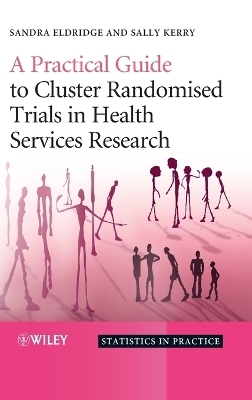
A Practical Guide to Cluster Randomised Trials in Health Services Research
John Wiley & Sons Inc (Verlag)
978-0-470-51047-6 (ISBN)
Guides readers through the stages of conducting a trial, from recruitment to reporting.
Presents a wide range of examples with particular emphasis on trials in health services research and primary care, with both principles and techniques explained.
Topics are specifically presented in the order in which investigators think about issues when they are designing a trial.
Combines information on the latest developments in the field together with a practical guide to the design and implementation of cluster randomised trials.
Explains principles and techniques through numerous examples including many from the authors own experience.
Includes a wide range of references for those who wish to read further.
This book is intended as a practical guide, written for researchers from the health professions including doctors, psychologists, and allied health professionals, as well as statisticians involved in the design, execution, analysis and reporting of cluster randomised trials. Those with a more general interest will find the plentiful examples illuminating.
Sandra Eldridge – Senior Lecturer, Medical Statistics, Queen Mary, University of London, UK Dr Eldridge is well experienced in designing and analyzing high quality cluster randomized trials, having worked on ten such trials since the mid 1990s. An award-winning speaker on randomized trials, Dr Eldridge has given numerous presentations in many settings and conferences over the last seven years.
Preface xiii Notation xv
Table of cases: Trials used as examples in more than one chapter in the book xviii
1 Introduction 1
1.1 Introduction to randomised trials 2
1.2 Explanatory or pragmatic trials 2
1.3 How does a cluster randomised trial differ from other trials? 3
1.4 Between-cluster variability 9
1.5 Why carry out cluster randomised trials? 10
1.6 Quality of evidence from cluster randomised trials 13
1.7 Historical perspectives 16
1.8 Summary 18
References 19
2 Recruitment and ethics 22
2.1 Selecting clusters and participants to enhance external validity 22
2.2 Ethics of cluster randomised trials 24
2.3 Selection and recruitment of participants to enhance internal validity 35
2.4 Retention of participants in the trial 41
2.5 Summary 41
References 41
3 Designing interventions 44
3.1 Lack of effectiveness of interventions evaluated in cluster randomised trials 45
3.2 What is a complex intervention? 46
3.3 Phases in the development of a complex intervention 50
3.4 Identifying evidence for potential intervention effect (pre-clinical phase) 50
3.5 Understanding more about intervention components (modelling phase) 53
3.6 Developing the optimum intervention and study design (exploratory trial phase) 55
3.7 What is the intervention? 57
3.8 Summary 58
References 58
4 Pilot and feasibility studies 60
4.1 What is a pilot study? 60
4.2 Reasons for conducting pilot and feasibility studies 63
4.3 Designing a pilot or feasibility study 69
4.4 Reporting and interpreting pilot studies 71
4.5 Summary 72
References 73
5 Design 74
5.1 Parallel designs with only two arms 75
5.2 Cohort versus cross-sectional designs 85
5.3 Parallel designs with more than two arms 88
5.4 Crossover designs 92
5.5 Further design considerations 95
5.6 Summary 96
References 96
6 Analysis 99
6.1 Data collection and management 99
6.2 Analysis – an introduction 101
6.3 Analyses for two-arm, completely randomised, stratified or minimised designs 104
6.4 Analyses for other designs 124
6.5 Intention to treat and missing values 129
6.6 Analysis planning 131
6.7 Summary 132
References 133
7 Sample size calculations 137
7.1 Factors affecting sample size for cluster randomised designs 138
7.2 Calculating sample size using the intra-cluster correlation coeffi cient 142
7.3 Sample size calculations for rates 145
7.4 Restricted number of clusters 146
7.5 Trials with a small number of clusters 149
7.6 Variability in cluster size 150
7.7 Comparison of different measures of between-cluster variability 154
7.8 Matched and stratifi ed designs 160
7.9 Sample size for other designs 166
7.10 Summary 169
References 169
8 The intra-cluster correlation coeffi cient 172
8.1 What is the ICC? 173
8.2 Sources of ICC estimates 175
8.3 Choosing the ICC for use in sample size calculations 179
8.4 Calculating ICC values 185
8.5 Uncertainty in ICCs 192
8.6 Summary 193
References 193
9 Other topics 196
Richard Grieve
9.1 Systematic reviews 197
9.2 Cost effectiveness analyses 207
9.3 Process evaluation 212
9.4 Monitoring 213
9.5 Summary 215
References 215
10 Trial reporting 218
10.1 Trial quality and reporting quality 218
10.2 Steps to improve trial reporting in the early stages of the trial 227
10.3 Reporting randomised trials in journal and conference abstracts 230
10.4 Application of CONSORT statement to cluster randomised trials 232
10.5 Summary 262
References 263
Index 267
| Reihe/Serie | Statistics in Practice |
|---|---|
| Verlagsort | New York |
| Sprache | englisch |
| Maße | 160 x 235 mm |
| Gewicht | 572 g |
| Themenwelt | Mathematik / Informatik ► Mathematik ► Wahrscheinlichkeit / Kombinatorik |
| Studium ► Querschnittsbereiche ► Epidemiologie / Med. Biometrie | |
| ISBN-10 | 0-470-51047-1 / 0470510471 |
| ISBN-13 | 978-0-470-51047-6 / 9780470510476 |
| Zustand | Neuware |
| Haben Sie eine Frage zum Produkt? |
aus dem Bereich


